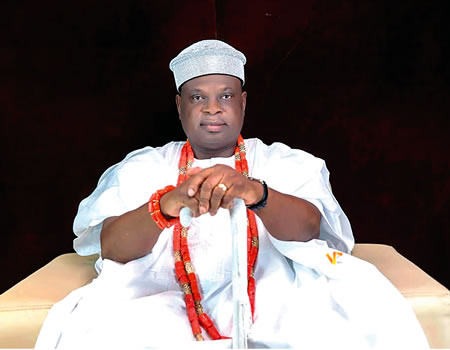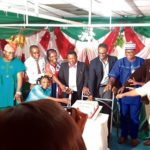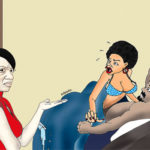What informed the visit by the Awori traditional rulers from Lagos and Ogun states to Ile-Ife?
The reason is very simple. The visit was a return to the root. It was home coming of sorts, and it was memorable in all respect.
Sex in car a crime — Lagos police boss
How can you describe your experience during the visit?
As I just said, it was a memorable visit reconnecting with our root. I want to believe you know that Ogunfunminire was one of the children of Okanbi. Ogunfunminire was the father of all the Aworis, which goes to say we are direct descendants of Oduduwa. Describing the visit is not important to me as the significance of it. For the first time, I could see where my forefathers emanated from. The Ooni conducted us round the family compound of Ogunfunminire. We also saw the well he used to draw water for domestic use. We saw where so many things took place. It was an emotional experience seeing those historical sites with which Ogunfunminire was connected before he migrated to Lagos.
What lessons have you derived in the trajectory of Ogunfunminire?
His life and journey to found Lagos meant he had a vision because Lagos was and is still wealth. He saw the wealth and migrated to site. Unfortunately, generations he left behind have not been able to actualise his vision. In Lagos of today, the Aworis are in the majority yet they have not produced a governor for the state. The state is our land but we don’t have economic power. I continue to think on why we are this disadvantaged. Because we lack economic power, political power also eludes us. And it is unfortunate despite the fact that we were the early settlers. While I was interrogating my mind on the likely causes of the problem, I asked myself if the problem is even not a curse. Is it a curse that we are both economically and politically backward? I am disturbed, and that is the truth of the matter. I am seriously disturbed just like every other Awori leader should.
What do you think is the solution to this identified problem?
The solution is in us as the Aworis. I realised that we don’t like one another. Hatred defines our relationship. We are our own greatest enemies. Even among traditional rulers, there is no genuine love. We like to fight one another over land matter. Land which should be our asset has been turned to a curse now as brothers decide to fight over it. For us to fight this economic and political backwardness, we need to bury the hatchet and come together to speak in one voice. Our differences have been what is being exploited to ride roughshod over us. But there is end in sight if we decide to say a good bye to the past and embrace new future. It is not impossible
You also visited the Oluwo of Iwo, Oba AbduRasheedAkanbi. What was your mission?
My visit to Iwo followed the same mission for which I had earlier visited other traditional rulers. I felt that we should seriously begin efforts towards a more united Yoruba nation. I was in the Oluwo’s palace, and found him pleasant like others I had visited. I first visited the Ooni, later, the Alaafin, the Orangun. I have also visited the Osolo of Isolo and other Awori traditional rulers. I enjoy doing these visits, and I will not stop doing them because the visits are to achieve a purpose. As a matter of fact, it is my resolve to do the visit every year.
Can you say your first visit to the Ooni propelled other Awori traditional rulers to visit Ile-Ife this time?
I would not say specifically. But I know that they may have also realised the need to return to where we all came from. It was a historic return to our origin. The Ooni is our brother and he played that role well during the visit. Everybody left in happiness.
Coming from academic environment to the palace, aren’t you missing the classroom?
There is no doubting that fact, and it is natural that one would miss where one is coming from. Let me put it in right perspective. I was coming from classroom where I was dealing with academic works and students. But I am now dealing with all sorts of people. Because of this, I would say it is a bit challenging. It was uninteresting too at the initial stage. But in the final analysis, it is a worthy sacrifice answering the call of my people to lead them as traditional ruler. And my resolve is to take the people out of where they were before I came to the throne. My resolve is to take them away from terrible economic and environmental condition to which they had long been subjected. And I have started to actualise my resolve to change the situation of my people.
Can we say the ongoing economic and security summit is one of what you meant?
Yes. It is good that you witnessed it and probably saw the paper presentations. Don’t forget where I came from. As an academic of my status, you should not be surprised that such a summit is taking place. That is how it is done in civilised world. The summit is a problem-solving ground where problems are identified and solutions preferred. And that was what we saw in the hall today.
Are you satisfied with the turnout and general organisation of the summit?
It is good that you were there. Whatever I tell you can be verified by yourself. I am pleased with the quality of papers we had. It showed that we had started on a good note. Subsequent editions would always be improvement over previous edition. I am happy for those who honoured us, including those who came to receive awards. I am happy that former Attorney General of the federation, Prince Bola Ajibola also came personally to receive his award. His presence added more value to the summit.
There are many industries in your town. How impactful are these industries on the people of your town?
Ota is an industrial town with functional industries everywhere. These industries are making it, that is why they keep expanding here. But in terms of their impacts on the people of my town, it is disappointing news.
Can you expatiate on this?
It is disappointing in the sense that non-indigenes dominate the workforce of these industries. Our sons and daughters working there are very few. At management level of many of the industries, you scarcely find Ota indigenes. That is one of the issues which the summit has also addressed.
Whose fault is this problem?
To be honest, our people share from the blame. No employer would give his job to the unwilling. Because we have not been serious with our lives; because we have been seen selling land and not seen in intellectual engagements, we lost the employment opportunities in these industries. In fact, some successful Awori indigenes don’t like to identify with their Awori brothers and sisters. In fact, I was one of those people. My friend, Kayode Opeifa, was surprised when he later knew that I was an Awori after a long time of our relationship. We saw the identity as a stigma. But things have begun to change now. My coming to the throne has changed it. Eminent indigenes are now coming to associate with their root now. I want my brothers and sisters to take the advantage now and change their worldview.
What do you have in place to change them from their old ways to productive citizens?
Already there is Foundation For Economic and Development Imitative (FECODEIN) in place. The vision is to lay foundation for the youth to be successful. We have spoken with investors to join us in this empowerment scheme. Credit would be given out with little interest, and we are also going to share useful information with the beneficiaries; information on how to grow and develop their vocations.
What is the state of security in Ota given the peculiarity of your youths?
I can say that we enjoy relative peace with the efforts of the police, the Navy and civil defence corps. The Area Commander who represented the commissioner of Police has been hardworking. The DPOs and other senior security agencies are cooperative in providing stable security to the town. You can see people going about their normal businesses in the market and elsewhere. That is a sign of the peace we enjoy.






